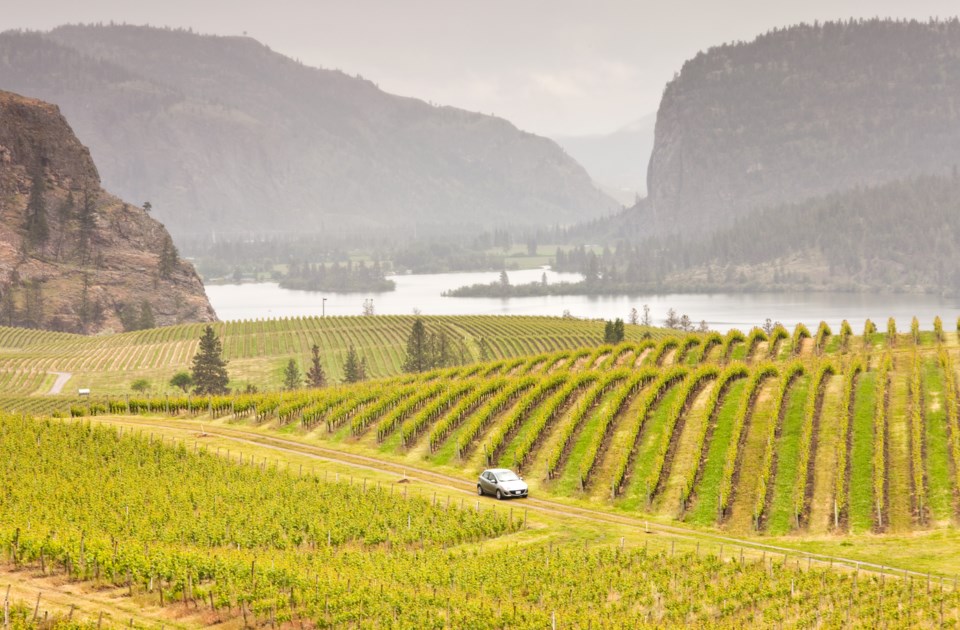An article recently in the New York Times is more than depressing for wine lovers, as it describes how climate change and unprecedented temperatures can potentially end more than 150 years of producing fine wines in North America, not only in California’s Napa Valley, but also production in other areas of California, Oregon, Washington State, and British Columbia.
The more than 300 forest fires currently burning in British Columbia are most heavily concentrated in the Okanagan and surrounding regions in the southeastern part of the province, the geographic area of the annual $2.7 billion production of the province’s fine wines. While small in comparison to fine wine production in California, it is not insignificant.
After months of below average precipitation causing drought in some areas, a week of historic record-breaking temperatures in late June here in British Columbia killed more than 500 people from hyperthermia (heat stroke). The daytime temperature here in Whistler reached 42 C (107.6 F), while a temperature of 49.6 C (121.3 F) in the BC town of Lytton, helped to spread a wildfire, which completely wiped this historic town off the map—with very little left but rubble.
Fine wine producing areas continue to experience temperatures in few other areas on the planet, such as California’s Death Valley, the Sahara, and the Gulf States of the Middle East. It is hard to imagine the destruction in the vineyards. I am amazed to learn that the threat is not just from cooked grapes turned into raisins on the vine, but from other serious and generally unanticipated threats:
As this article in The New York Times confirms, we've learned that smoke, even from distant forest fires, can be absorbed by grape skins. Try adding a few drops of Woodland brand hickory smoke flavour into your glass of chardonnay or cabernet sauvignon … Yuck!
I’m not used to the idea that vineyards in Napa are already spraying sunscreen (toxic chemicals) to keep the vines cooler! One is reminded of the hair-brained suggestion by former U.S. President Donald Trump to ingest bleach to combat COVID-19. Wine is generally thought of as a natural product. Not if we are drinking SPF 30 or higher!
Vineyard irrigation, unlike in fine wine producing Appellation Contrôléé areas of France, is not prohibited by law in North America, and already in California, where it is almost universal, wells and lakes have dried up and “treated” wastewater is being trucked to vineyards in the Napa Valley where grapes are shrivelling due to water deprivation.
It will take me a long time to get used to the idea that human sewage is part of what is in my glass. Treated or not, it is human sewage effluent.
Insurance is being universally denied to wine producers, or is six times the cost for half the coverage if available, likely driving many wineries in California and elsewhere out of business in the future.
It seems like so many things we used to produce now come from China. Are you ready for Great Wall Cabernet Sauvignon, Chairman Mao Merlot, Dragon Zinfandel, and飞跃仙粉黛 Cabernet Franc?
The phylloxera beetle in Europe in the late 1800s almost entirely wiped out the production of fine European wines, saved by science as fine varieties were grafted onto American phylloxera-resistant rootstocks. At present there is no scientific trick on the horizon to save the traditional North American wine industry.
Even with the unlikely drastic and unachievable promises by all 196 countries that signed to the Paris UNFCC (climate accord treaty), this is an effort to limit the global temperatures to an increase of only 2 C (3.6 F) this century.
It is well-known that global warming will cause more erratic changes in short-term weather, such as frequency and severity of hurricanes (a.k.a. typhoons and cyclones), monsoon rains, and “heat domes,” a new term for what we have experienced this summer in Whistler and elsewhere in the western part of our continent.
In the future, Canada’s Northwest arctic territories may become the source of fine wines, if we can just get rid of those pesky musk ox, wolves, arctic foxes, and reindeer, not to mention mosquitos. In the meantime, I plan to continue to drink French wine no matter what the cost.
Doug Garnett // Whistler



